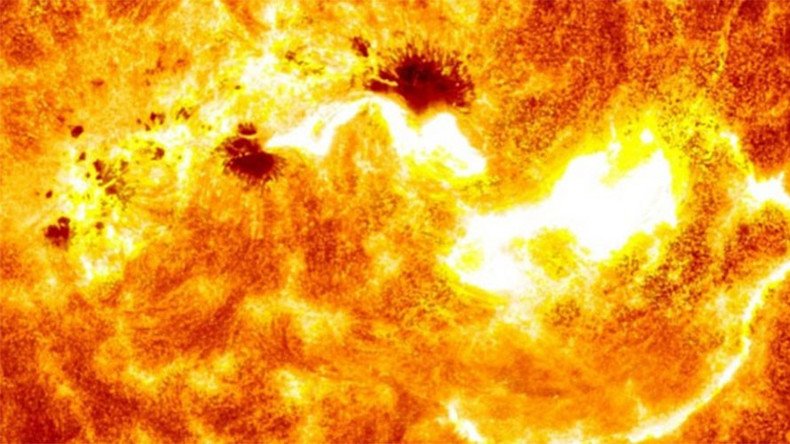Scientists warn devastating solar storms could disable communications, electronics

Scientists are warning of the devastating impact that extreme solar storms could have here on Earth by knocking out our communication systems and disrupting electronics – possibly for years.
Solar storms are the eruptions of mass and energy from the surface of our sun. The sudden release of huge amounts of magnetic energy from the solar storms can collide with Earth’s own magnetic field.
READ MORE:Solar storms could be more powerful than previously assumed, technology at risk - study
Solar storms cause amazing aurora displays over the Earth, but at their most extreme, could significantly disrupt Earth’s communications satellites and shut down air travel, computers and telephones.
It is unclear when a storm of this magnitude could hit but scientists are urging governments to be prepared.
The largest geomagnetic storm on record, the Carrington event, took place in 1859, knocking out telegraph systems across Europe and the US. In 2012 a solar storm of similar power occurred but passed the Earth's orbit without striking.
Space weather specialists recently reiterated the importance of being prepared for a "low probability but high-impact" solar storm at a conference in Washington DC attended by experts from the US government and military, as well as private industry and academia.
Solar storms: how UCL scientists are predicting & preparing for the Sun's violent activity https://t.co/yGprb0smp4pic.twitter.com/E132hg1W5B
— UCL (@ucl) April 4, 2016
"Once systems start to fail, [the outages] could cascade in ways we can't even conceive," said Daniel Baker, director of the Laboratory for Atmospheric and Space Physics at the University of Colorado, EurekAlert reports.
Particularly powerful solar storms could wreak havoc in myriad other ways, such as corroding water and sewer pipes, and ruining computer memory as well as damaging other important electronics.
The effects could also be serious for astronauts at work in space, exposing them to high levels of radiation beyond their permissible exposure levels within hours of a powerful solar storm.
Minor solar storms, during which NASA detected anomalies in the agency’s deep space missions, have already caused a blackout in Sweden.
In a separate solar storm instance, flight-control systems in Sweden were interrupted by a solar storm, bringing a halt to air traffic in the area.
The US has developed certain contingency plans for coping with a major solar storm, and space weather has been added to the Federal Emergency Management Agency daily briefings, TechRadar reports.
Ralph Stoffler, the director of weather, deputy chief of staff for operations at U.S. Air Force headquarters in Washington, told the DC conference the Air Force was currently expanding its network of sensors to monitor space weather, including placing them on all of its satellites.
Two part Earth-directed #solarstorms launch today in chain-reaction! Expect weak impact Apr 10-11. #Aurora possible! pic.twitter.com/hP1sVNgMzT
— Dr. Tamitha Skov (@TamithaSkov) April 7, 2016
Earth had a near miss in 2012, when an eruption on the sun produced an unusually large and powerful ‘coronal mass ejection’ (CME) solar storm that missed striking the planet by just nine days.
A CME involves the violent release of gas and magnetic fields, and can contain a billion tons of matter traveling at colossal speeds, according to NASA.
In a 2013 report, the insurer Lloyd's of London put the cost of the US electric grid’s recovery from a significant solar storm at between $600 billion and $2.6 trillion.
The company said that an extreme magnetic storm “is almost inevitable in the future,” but points out that “the probability of an extreme storm occurring is relatively low at any given time.”












